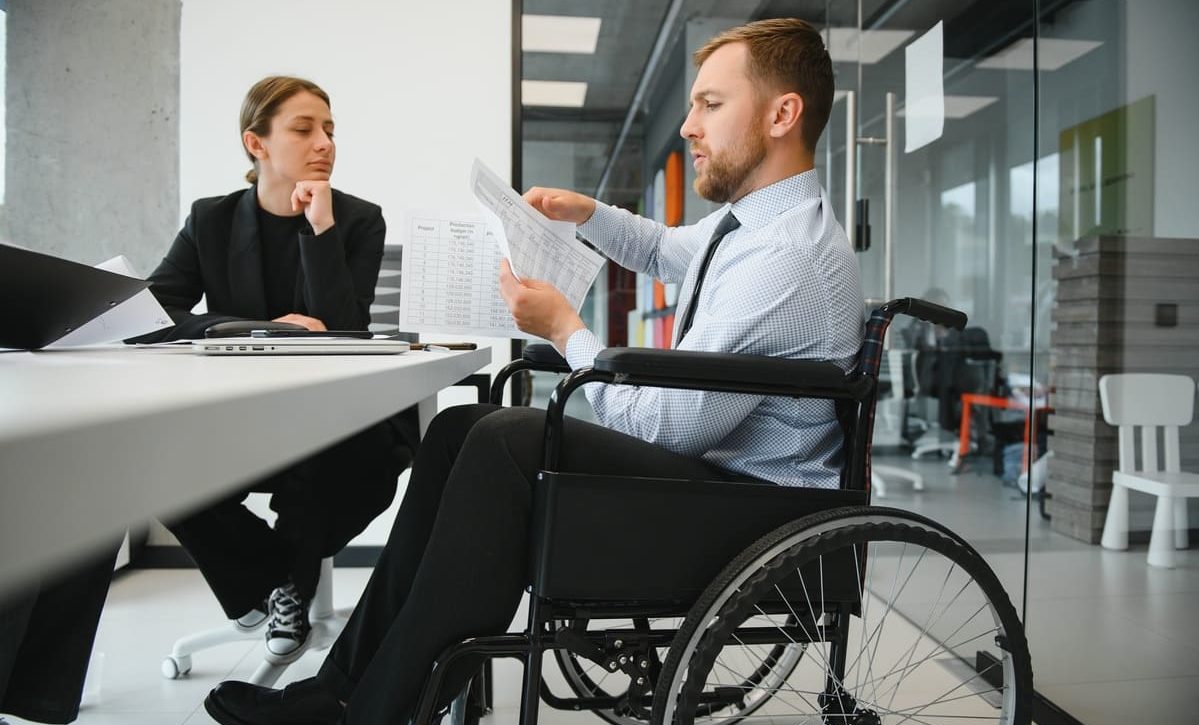
The Fee Is Free Unless You Win.
Top Rated Employment Law Firm
Protecting Families Since 1995
$450 Million Won
TABLE OF CONTENTS
Disability discrimination in New York City occurs when an employee or job applicant is treated unfairly or harassed by an employer, supervisor/manager, CEO, co-worker, client/customer, vendor, or other non-employee because of a disability. The disability can be visible to the public or could be something that is only known if you choose to let people know it exists. Both federal and state laws prohibit disability discrimination in the workplace. For over 25 years, the experienced attorneys at the Derek Smith Law Group have helped victims of disability discrimination, just like you, get the compensation they deserve.
Disability discrimination in the workplace occurs when an employee or job applicant is treated unfairly or harassed by an employer, supervisor or manager, CEO, co-worker, or non-employee because of a disability. Under both federal and state laws, it is prohibited to make any type of employment decisions solely based on a person’s disability. In addition, the law requires an employer to make reasonable accommodations for an employee or job applicant who is disabled so the individual can continue to work in his or her current position.
Disabilities may be visible to the common person or may not appear unless someone tells you about them. Some common disabilities may include, but are not limited to:
The Americans with Disabilities Act (ADA) is the federal law that protects employees and job seekers in companies with 15 or more employees from discrimination in the workplace based on covered disabilities.
The New York Human Rights Law (NYHRL) and the New York City Human Rights Law (NYC HRL) are state and local laws that protect employees and job applicants in companies with 4 or more employees from discrimination in the workplace based on covered disabilities.

In order to prove disability discrimination in the workplace, you must produce evidence that you were treated unfairly or harassed because you are disabled. This can be done in three ways: direct evidence; disparate evidence; and policy evidence.
Disability discrimination in the workplace comes in many different forms. Sometimes it is blatantly harassing or unfair treatment based on a person’s disability. Other times, it is more subtle and may not be something everyone would notice. Some examples of discrimination against disabled employees may include, but are not limited to:
Disability discrimination in the workplace in New York City claims are filed with the Equal Employment Opportunity Commission (EEOC) under the Americans with Disabilities Act. The time limit to file a claim is 300 days from the date of the last incident of discrimination. The EEOC will investigate the claim to make sure it falls within the guidelines of the ADA and issue a Right to Sue letter. Then, you can file a lawsuit in federal court for your claim.
If you have a claim under the NYC HRL, you have a time limit of one year to file a claim with the New York City Commission of Human Rights. The Commission will investigate the claim and allow you to proceed with your case if your claim meets the guidelines.
As a victim of disability discrimination in the workplace, you have rights. New York City courts offer relief for victims to help them maintain those rights. Some of the remedies available may include, but are not limited to:
Discover how our expertise has helped clients overcome their legal challenges and achieve successful outcomes.
View All TestimonialsOlivia is the best! Oliva was very thorough, patient, and very detailed and descriptive regarding the process. She was very supportive of my sexual harassment case. From the very beginning, she communicated and would provide me with any updates and she was always available when I needed anything. More importantly, she always extended that comfort level of trust which always made me feel at peac... Read Full Testimonial
Casey Barkhordarian is a fabulous attorney to work with. He explained everything to me about the case (including the millions of questions I asked) right from the start of our very first meeting. He did so in a way that I could understand and was very prompt and clear with communication the entire time. Casey Barkhordarian is a very competent and knowledgeable lawyer to have on your team. I def... Read Full Testimonial
Matt Finkleberg is by far the best attorney I’ve ever hired! From the outset, it was evident that he was not just another lawyer; Matt is nothing short of extraordinary. He possesses the ability to do his job phenomenally while somehow managing to give me hope during one of my darkest of hours. Matt consistently returned my calls promptly, regardless of my questions, confusion, or self-doubt ... Read Full Testimonial
I cannot speak highly enough about my experience working with Matt Finkelberg. From the very beginning, Matt approached my case with an incredible level of professionalism, knowledge, and dedication that immediately put me at ease. It is rare to find an attorney who not only possesses an impressive depth of legal expertise but who also truly cares about the well-being and best interests of thei... Read Full Testimonial
Olivia is absolutely outstanding! She understands the emotional side of your case while being able to find the legal aspects of holding the employer accountable for breaking the law! Made a really terrible situation a little easier by explaining everything and helping me get everything in order and in the right hands. I would not use anyone else! Call them for any sexual harassment case... You ... Read Full Testimonial
This law firm is absolutely amazing!!! They went so above and beyond for me!!! I am so grateful for all their help with my difficult case!!! If you need a lawyer, you will be in great hands with their firm!!! And wait until you see the office! The building is so high tech I couldn't figure out how to get in the elevator lol!
It was a pleasure to have Casey represent and help me for my employment case. It was my first time needing an attorney, so I was a bit apprehensive at first – Casey took the time to answer all of my questions and fully explain everything to me, which really put me at ease. He was very attentive, supportive, and knowledgeable throughout the whole process – Casey would ask questions to ensure... Read Full Testimonial
matt is an excellent attorney. he handled my case with the utmost care and highly exceeded all expectations. i could not recommend derek smith and esp. matt finkelberg enough
matt is an excellent attorney. he handled my case with the utmost care and highly exceeded all expectations. i could not recommend derek smith and esp. matt finkelberg enough 🙂
Matt handled a suit against the City of LA and members of the a Neighborhood Council for racial discrimination and harassment. Ths was the first suit of this type filed on a Neighborhood Council Matt handled it with poise and above all professionalism. He walked me through the 3 year process and above all provided moral support and encouragement as I still experienced racism and harassment duri... Read Full Testimonial
Matt Finkelberg is Amazing and Devotional! It was a pleasure to have Matt represent me for my employment case. He was very attentive, supportive, and knowledgable throughout the whole process. Whenever I reached out he responded promptly which I greatly appreciated. Matt fought diligently and hard throughout my case to make sure my case was represented best. Thank you again Matt for everything.... Read Full Testimonial
It was a pleasure to have Casey represent and help me for my employment case. It was my first time needing an attorney, so I was a bit apprehensive at first – Casey took the time to answer all of my questions and fully explain everything to me, which really put me at ease. He was very attentive, supportive, and knowledgeable throughout the whole process – Casey would ask questions to ensure... Read Full Testimonial
Our dedicated attorneys are ready to fight for your workplace rights and ensure justice!
A lawsuit for disability discrimination in New York City can last anywhere from 4 to 6 months to a year or longer. If your employer is willing to negotiate a fair settlement, your lawsuit may settle in as little as 4 to 6 months.
However, if your employer is not willing to negotiate, your case may take 8 months to a year or longer to prepare for trial. The trial may then last another few days to several weeks or more before a judgment is entered.
As a victim of disability discrimination in the workplace, there are several things you can do while you determine whether you wish to bring a lawsuit against your employer.
1. Contact an experienced disability discrimination lawyer immediately.
2. If you are still employed, do not quit your job until you consult with your attorney.
3. If your company has an HR department, file a complaint in writing regarding the discrimination based on your disability.
4. If your company has a disability discrimination policy, follow it.
5. Gather evidence. Document every incident including what occurred, who was involved, when and where it occurred, and any witnesses.
6. Do not waste time. You have a year or less to file a claim for disability discrimination in New York City. Do not wait until it is too late.
All employees deserve an opportunity to work in a place free from discrimination, whether they are disabled or not.
If you are a victim of workplace disability discrimination in New York City, the experienced attorneys at the Derek Smith Law Group can help.
Contact us today at (215) 587-0760 for your free consultation. We do not collect any money until you win your case.

Our experienced legal team provides reliable services in key U.S. cities, ensuring expert assistance for workplace discrimination and employment law matters wherever you are located.
Our experienced employment lawyers are dedicated to resolving your workplace rights concerns with expertise and care.